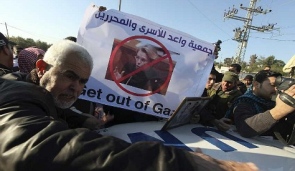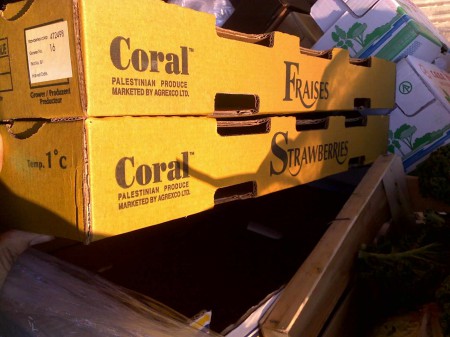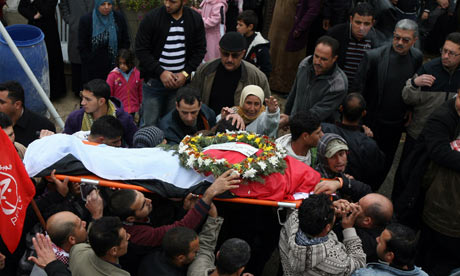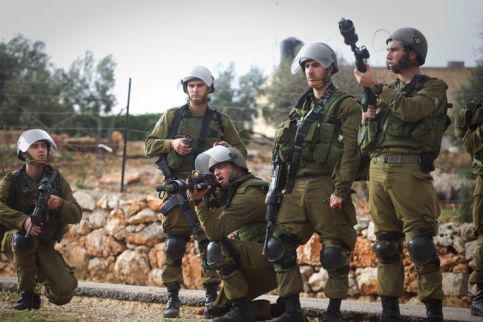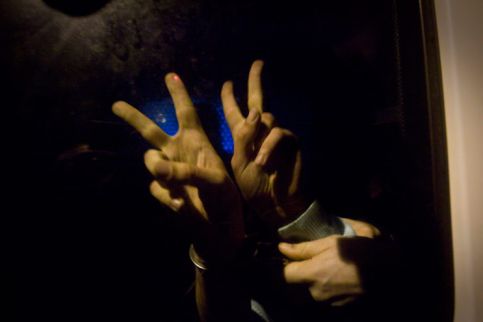EDITOR: Palestine Papers continue to sting both Israel and the PA, as well as the US and UK
Today we learn that bot MI6 and the CIA have worked tirelessly to get rid of the Hamas movement for a decade, assisting Israel and the PA in their various attempts to thwart Hamas as the leading force in Palestinian politics. What the result of their effort was we all remember well – the Hamas victory in the Palestinian elections six years ago, and the strt of the longest ever blockade of over a million and a half people, mostly refugees, in what has become the largest open air concentration camp on earth.
Palestinians will be pleased to learn that their ‘leaders’ in Ramallah were discussing the extra judiicial murder of a number of Palestinian activists, some who have indeed been murdered eventually. What emerges from those meetings is the great intimacy between the sides, as well as the deep contempt in which the very leadership of the PA is held by Israel and the US; on the one hand, they make use of them, on the other, they really despise them. Not an atypical colonial scenario, and one Franz Fanon wrote well about over fifty years ago.
Then it gets even better – the South American option of resettling the refugees is now blown open, shocking people in those countries as well as the refugees themselves. This will run and run.
The besieged leadership in Ramallah, has in the meantime flipped a number of times, in the time-honoured fashion so beloved of the Israeli leadership… it seems that by working closely together for many years, some of the Israeli methods have rubbed off, and adopted by the Palestinian democrats… First, like the IDF always does in such cases, they called the papers a ‘pack of lies’ and dubbed Al Jazeera as “Zionist’, then today comes the admission that the papers are indeed genuine, and the PA is looking for the culprit who leaked them… The problem for them is not that Al Jazeera are zionist, but that they themselves emerge from this round of the revelations as ardent Zionists…
It is clear that we will soon learn of arrest and trioal of Palestinian ‘traitors’ who leaked the papers, in the tradition beloved of Middle Eastern regimes. Israel has done the same in the case of Anat Kamm, for example. Whoever tells the truth will pay dearly, no doubt. However, should not the corrupt leaders in Ramallah be worried about the wind blowing East from Tunis, already affecting Egypt? The hot Khamsin is almost due, coming normally around March, and blowing for fifty days, supposedly, hence its name. This time, the Khamsin has come early, and the corrupt leaders might do better than trying top continue lying, torturing and silencing their populations. Maybe they are better looking for a nice place in Saudi Arabia?
Well, this Khamsin might even blow that far.
Palestine Papers Part 3
Palestinian negotiator rejects claims of back door deals with Israel: The Guardian
PLO chief negotiator Saeb Erekat says leaked documents show how passionately Palestinians want peace
• Saeb Erekat: Papers are a distraction from the real issue
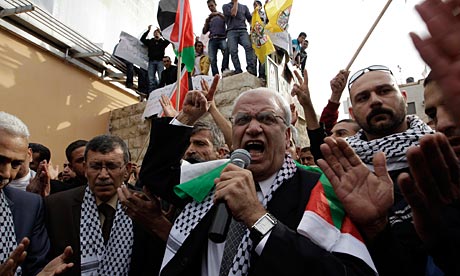
The PLO’s chief negotiator, Saeb Erekat, has described the leak of confidential memos documenting a decade of Middle East peace talks as a “slander campaign” and insisted that no single concession will be agreed without a comprehensive agreement with Israel, whose colonisation of Palestinian land is the “only constant”.
Writing in today’s Guardian, Erekat rebuffs accusations that he has been involved in “backdoor dealings” with Israel, but fails to repeat his previous claim that the documents – obtained by Al-Jazeera TV and shared with the Guardian – are “a pack of lies”.
He says the lesson that should be drawn from the documents is that the Palestinians are serious about peace.
“What should be taken from these documents is that Palestinian negotiators have consistently come to the table in complete seriousness and in good faith, and that we have only been met by rejection on the other end,” he writes. “Conventional wisdom, supported by the press, has allowed Israel to promote the idea that it has always lacked a partner. If it has not been before, it should now be painfully obvious that the very opposite is true. It is Palestinians who have lacked, and who continue to lack, a serious partner for peace.”
He underlines that any solution agreed in negotiations must pass a Palestinian national referendum – though the documents reveal him admitting that it will not be possible to hold a vote outside the West Bank and Gaza, which would leave millions of refugees in Jordan and Lebanon unable to take part.
Evidence from the papers shows Palestinian negotiators agreed privately in 2008 to let Israel annex all but one of the settlements built illegally in East Jerusalem and accepted the return of a symbolic number of 10,000 refugees to Israel. “Nothing would be agreed,” Erekat writes, “until everything is agreed”.
The papers also show the PLO working closely with Israeli security forces to target Hamas and other militants.
Publication of the Palestine papers has generated angry reactions from Palestinians, especially the PLO’s Islamist rival Hamas, which advocates armed resistance and will only negotiate with Israel on a long-term ceasefire.
The latest revelations show Tony Blair, envoy for the Quartet, was perceived by PA officials to have a pro-Israel stance and to advocate “an apartheid-like approach to dealing with the occupied West Bank”. A spokesman for Blair said today: “There has been real change on the ground as a result of Tony Blair’s efforts. The economy is now flourishing in the West Bank with double digit growth and falling unemployment. Palestinians are now able to move in the West Bank in ways impossible when Tony Blair started pushing for changes in the access and movement regime.”
Other papers describe how the Palestinian president, Mahmoud Abbas, tried to persuade a Palestinian businessman to contribute millions of dollars to a radio station for the Iranian opposition after the country’s presidential elections in 2009.
Abbas’s move was cited by Erekat in a meeting with the US Middle East envoy George Mitchell as evidence of the PA’s support for US goals in the region, especially its attempts to counter the influence of Iran, which finances Hamas and Lebanon’s Hezbollah.
PA stonewalled the Goldstone vote: Al Jazeera online
PA, with US encouragement, delayed a UN vote on the Goldstone Report into war crimes committed during Israel’s Gaza war.
”]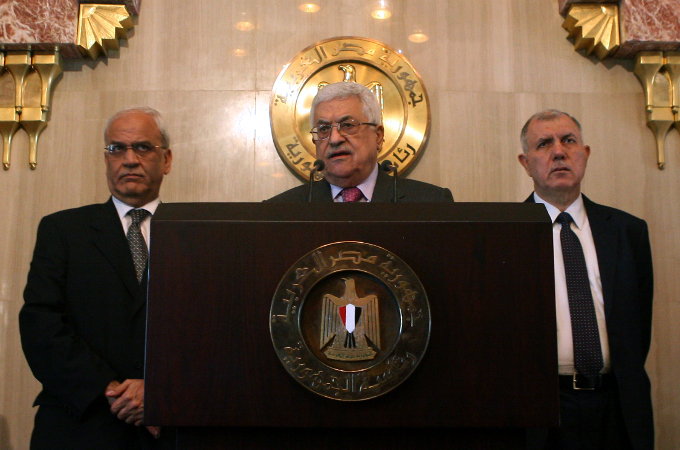
The Palestine Papers reveal the conversations between US and PA officials in the days before the vote [EPA]
On October 2, 2009, the UN Human Rights Council was widely expected to pass a resolution supporting the Goldstone Report, the UN’s probe of war crimes committed during Israel’s war in Gaza in December 2008 and January 2009.
The Council instead agreed to delay a vote on the report until March 2010, following major reservations expressed by the Palestinian Authority, the United States and Israel.
A UNHRC endorsement of the report would have brought Israeli officials one step closer to prosecution before a war crimes tribunal, an event many Palestinians were anxious to see.
But, as The Palestine Papers reveal, the Palestinian Authority apparently sacrificed a potential victory for Palestinian victims in exchange for favorable assurances on negotiations from the United States and, they hoped, from Israel.
Quid pro quo
The Goldstone Report, formally known as the Report of the United Nations Fact Finding Mission on the Gaza Conflict, was released in mid-September 2009 amid calls for a review of Israel’s wartime practices. The probe was led by Richard Goldstone, a former South African judge; it identified war crimes committed overwhelmingly by Israeli forces, but also by Hamas, during Israel’s war on Gaza.
Both the United States and Israel were outspoken in their criticism of the report, claiming that any UN endorsement would endanger the peace process and future Palestinian-Israeli negotiations.
Palestinian president Mahmoud Abbas has already admitted that the PA asked for the postponement; he said at the time it was to secure more international support before the vote.
“Since we felt we would not be able to gather enough support we asked for the postponement,” Abbas said in October 2009. “We wanted to reach mechanisms that would ensure the implementation of the decision and punish the perpetrators of crimes against our people.”
What The Palestine Papers demonstrate is that, in the weeks preceding the vote, the United States apparently urged the PA to stall the report as a means of restarting negotiations with Israel.
At a September 24, 2009 meeting between Saeb Erekat, George Mitchell and David Hale, the latter informed Erekat that “Our intention is to move quickly to relaunch negotiations. We are wrapping up an agreement on a package with Israel, and including other parties.”
Erekat resisted, saying “I simply cannot afford to go into a process that is bound to fail. I am trying to defend my existence and way of life.” Mitchell informs Erekat that President Barack Obama’s “attitude was consistent: we need to proceed to negotiations; delay will not be beneficial to anyone.”
During the same meeting, the U.S. also stressed to the PA that it was actively engaged in supporting the PA through other means. Mitchell informs Erekat, “I’ve devoted half my time over the last several months to things like getting you support (for example with Kuwait), not just financial. We will stay the course on this.”
At end of the meeting, Mitchell invites Erekat to Washington, D.C., on the day before the UNHRC was due to vote on the Goldstone report. “Regarding coming to DC next week…you should come next Friday,” Mitchell said. Erekat resisted, countering, “That does not give us enough time to go back and consult…”
The Palestine Papers further divulge that during the exact time of the crucial UNHRC vote, Erekat was in Washington, D.C. seeking more guarantees from the United States.
During a meeting at the U.S. State Department with Mitchell and Hale, on October 1, 2009, Mitchell reiterated to Erekat not only the U.S.’s commitment to a new round of talks, but also U.S. willingness to take a more active role on behalf of the Palestinians.
Mitchell said the U.S. would “explicitly repeat its position on Jerusalem (non-recognition of Israeli annexation and related actions; demolitions, evictions etc.) In such a situation, with negotiations going on, if [Israel] make a provocative announcement, the US has the leverage to state that this undermines the process, and that Israel is acting in bad faith in the negotiations.”
Erekat further bared not only the PA’s reliance on the United States, but the PA’s desperation to get back to the negotiation table. Erekat informs Mitchell that “peace through negotiations is a strategic choice… Our whole future depends on it, and we are counting on the US to help us… Another failure will be devastating.”
The following day, on October 2, 2009- while President Abbas was in New York pushing to postpone the vote on Goldstone – Erekat again met with Senator Mitchell. This time, Erekat appeared to use the expected international backlash to the vote deferral as a bargaining chip in proving their commitment to peace talks.
“I did not come here to complain, but to try to help move forward,” Erekat told Mitchell. “Many people strongly objected to [Abu Mazen] going to NYC and me coming to Washington.”
Mitchell continued building a case to Erekat and the PA on why all parties should move quickly to negotiations. “For 60 years, the choices open to the Palestinian people have become less and less attractive,” Mitchell said. “The circumstance under which they live worse and worse…..Believe me it is the best time.”
Erekat, meanwhile, only seemed to further push Palestinian priorities behind those of even Israel. “We find ourselves in the eye of the storm,” Erekat lamented to Mitchell. “We pray every day that Israel will come to the point where they realize that a Palestinian state on the [1967] border is in their interest…That’s why we are frustrated. We want to help the Israelis.”
At the very same meeting, Senator Mitchell presented Erekat with a document containing language that, if agreed to, would nullify one of the PA’s few weapons – the chance to prosecute Israeli officials for war crimes in Gaza at the International Criminal Court at The Hague. The U.S. language stated:
“The PA will help to promote a positive atmosphere conducive to negotiations; in particular during negotiations it will refrain from pursuing or supporting any initiative directly or indirectly in international legal forums that would undermine that atmosphere.”
Erekat, Abbas and the Palestinian Authority accepted the language and simultaneously agreed to call for a deferral of the UNHRC vote. Unsurprisingly, this decision was met by outrage, as Palestinians and Arab nations condemned the PA leadership for kowtowing yet again to American and Israeli pressure.
Israel leaked the PA’s support for the resolution deferral on the day before the UNHRC vote was to take place. Erekat, undoubtedly caught off-guard, was outspoken in his complaints weeks later to the U.S. on what he perceived as unfair Israeli tactics. In a meeting with U.S. National Security Adviser James Jones on October 21, 2009, Erekat revealed:
“Then came Goldstone and all hell broke loose. You know the first public response to the Goldstone thing came from Lieberman, who said Abu Mazen agreed to postpone the vote because the Israelis threatened to release the “tapes” showing him coordinating the attack on Gaza with Israel. Then there was the report that he did it for Wataniya, which they said is owned by his two sons.”
Jones, however, was quick to assure Erekat that the PA’s efforts would not go unnoticed. “And thank you for what you did a couple weeks ago,” Jones told Erekat. “It was very courageous.”
That same day, Erekat also met with Mitchell, and wasted no time in asking for the U.S. to deliver on its previous promises.
Erekat: When can you give me something, a document or a package, so I can take it to [Abu Mazen], so we can study it in good faith?
Mitchell: Much of what I read is not controversial…
For the United States, and unfortunately for the PA, it was simply business as usual.

